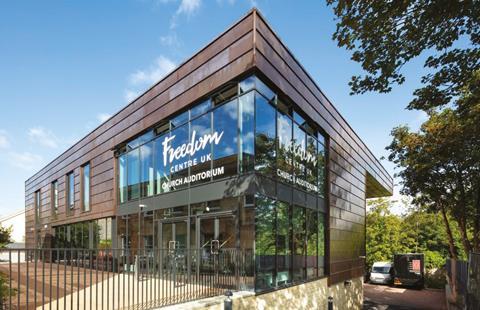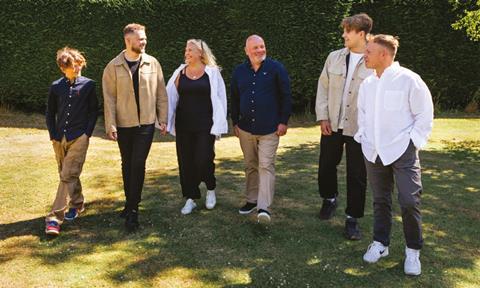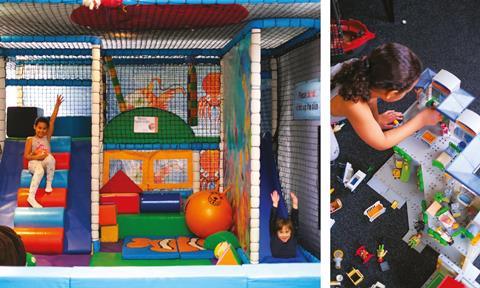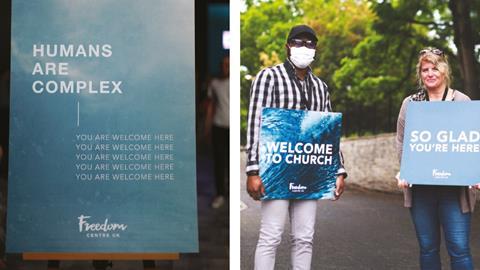Following the fallout from the pandemic, psychological illnesses are at record levels. Megan Cornwell visits a church in Bath which is pioneering new ways of binding up the broken hearted
To look at Jonty, you wouldn’t know he had recently been fighting some battles. Like so many of the one-in-four of us who struggle each year with poor mental health, outwardly he appears fine. More than fine, in fact. The 40-year-old husband and father-of-three has been a committed Christian for two decades, and by day he is a highly successful software engineer.
But Jonty also has asthma and, over the years, he has struggled with anxiety and low self-esteem. When he caught Covid for the second time in April he found his lung condition worsening – and his mental health deteriorating along with it.
Anxiety reared its ugly head again, along with familiar feelings of helplessness and abandonment. I’ve got to get to church, he thought to himself. If I get to church then something will happen. There was a healing meeting scheduled for that coming Sunday, and Jonty resolved to be there.
When he arrived for the service, he immediately began praying – “God’s just so good. I knew he would do stuff”, he tells me.
In his mind’s eye, Jonty saw a picture, which he recognised as his very early childhood. “I was looking at my mum,” he recalls. “My mum was lovely; she did her best. But I knew she’d had postnatal depression. The picture was me as a baby. I couldn’t move and my mum was very disengaged and clearly couldn’t cope. It was quite odd, because I could feel the feelings that I felt then: the worry, the rejection, the ‘I’m not good enough’. I could fully understand how that baby felt.”
In that moment, the Holy Spirit imparted a truth that unlocked years of Jonty’s questions and self-doubt: “So much of the fear and the need to build this fortress around me – so that no one could see that I’m not as good as people might think I am – I realised it all went back to my mum, to that pre-verbal experience of rejection.”
When Betsy asks the congregation whether this church has been positive for their mental health, a sea of hands shoots up in agreement
His immediate response to the revelation was: I’m a Christian, I know what to do with this! He forgave his mum and waited…but nothing happened. There was no sense of relief. No feeling of peace flooding his body. So Jonty started singing: “Holy, holy, holy. I am yours,” he cried out.
Then God showed him the picture again, but this time asked: “Whose arms are you in right now?” Jonty chokes back tears as he remembers what God whispered next: “You’re in mine. Right now you are looking at that lady who couldn’t cope. Who couldn’t deal with you emotionally. But that was never my plan. I always held you.”

“The weirdest thing happened next,” he explains. “The feelings of rejection and anger – and all that stuff – became unnecessary and unneeded.” He was free.
A week later, for the very first time, Jonty phoned his mum and the conversation wasn’t overshadowed by fear. He also found that at work, during one of his asthma attacks, the terror – so commonplace whenever he struggled to breathe – had vanished.
Freedom
This is Freedom Centre UK and I’ve come here to listen to the stories of those experiencing healing from past pain and current mental health problems in a church led by Pastor Betsy de Thierry.
Betsy is a trained psychotherapist with a calling to support people recovering from trauma – which is any distressing experience defined by feelings of terror or powerlessness.
She travels all over the country delivering training courses for secular clients that include government departments and police forces. She’s also using her expertise to lead a church of 500 in a trauma-informed way.
With a mother-hen warmth about her, the 50-year-old mum-of-four, who comes from a long line of Anglican clergy, explains that stories like Jonty’s are commonplace in this evangelical church that has been serving its local community in Bath for the past two decades.
She describes some services as being “like a revival”, because the healings have been dramatic and numerous. After speaking to other church members with moving tales of restoration and belonging, I realise this isn’t just hyperbole from Betsy – who reminds me of a blonde Miranda Hart; full of quirky phrases and a sense of fun.
Something profound might just be happening here. In fact, when Betsy asks the congregation, halfway through the morning service, whether this church has been positive for their mental health, a sea of hands shoot up in agreement.
As we tour the converted Grade II listed building, looking at the rooms for their youth and children’s work, and the pre-loved prom dresses and school uniforms for those struggling financially, one thing is clear: Freedom Centre UK has thought of everything.
From the simple, sensitive welcome signs that greet you as you enter the church carpark – ‘Good to see you!’ and ‘You are welcome here’ – to the affordable lunches available every Sunday; from the new member packs containing chocolate and ear plugs (in case the music gets too loud) to the comfy chairs available for those who’ve had a particularly tough week.
This church really is a nice place to be yourself. And so, at 4pm, many hours after the morning meeting has ended, most congregants are still hanging around, chatting, eating and having fun. If we talk about church as family, this one is The Brady Bunch.
But being trauma-informed isn’t just about a kind welcome (although that’s a big part of it), nor is it simply providing for those in need (lots of churches do that commendably). It’s a more holistic approach that is rooted in neuroscience and self-awareness, and I was here to find out whether churches that adopt it could make a difference to the mental health crisis we’re currently living in.

What does trauma-informed mean?
In 2001, the pioneers of the trauma-informed approach, Dr Maxine Harris and Dr Roger Fallot, began to recognise the growing prevalence and impact of trauma in people’s lives.
Whether physical, sexual, emotional or otherwise, recent or in childhood, this trauma would lead to negative behaviour directed towards oneself and others, particularly when a person is ‘triggered’ by a memory of the people or places that caused them harm.
Harris and Fallot advocated for trauma-informed public services, where professionals are equipped with skills to better understand and respond to traumatised people, so that outcomes for individuals and society could be improved.
In recent years, being trauma-informed has grown in recognition and respect among a number of councils, charities and schools in the UK who have adopted its ethos and principles.
Christians need to know that when anxiety or depression comes knocking, the Church will be part of the solution, not the problem
Considering society’s exposure to life-changing events during the pandemic, advocates believe this approach couldn’t be more urgently needed. We know, for example, that many medical staff on the frontline during the Covid-19 crisis, who witnessed people die in ambulances and on ventilators, now have post-traumatic stress disorder (PTSD).
Those who lost loved ones, or caught the virus before vaccines were available, struggled psychologically in the aftermath. Children trapped by lockdown in domestic violence or sexual abuse have trauma that might take years to process and heal.
And then there’s everyone else. Those who were doing fine before the pandemic, but thanks to a prolonged season of financial struggle, stress or lockdown loneliness, have found their resilience waning.
As Australian church leader and cultural commentator, Mark Sayers, recently told Premier Christianity: “We’ve just lived through a natural disaster. When you go through [an event like] an earthquake, it’ll sometimes take five years to recover.”
This perhaps explains why the numbers seeking medical support for poor mental health are on the rise. Adults on antidepressants in England increased by roughly 500,000 this year, to 8.3 million.
This total equates to the entire population of New York City – or 90 Wembley Stadiums full of people. And it’s the sixth year in a row we’ve seen an increase in both patients and prescriptions.
If we consider the repercussions of the cost of living crisis and factor in political instability in the UK and abroad, these figures look set to continue rising. So where does that leave the Church?
PASTORING THE FLOCK
“Trauma is the primary weapon that the enemy uses to destroy people’s lives,” explains Betsy, who tells me it’s the leading cause of mental ill-health. One of the foundational Bible verses of Freedom Centre UK is Isaiah 61, about “[binding] up the broken-hearted” and proclaiming “freedom for the captives”.
She reads this through a therapeutic lens, as promises for those who put their trust in Jesus and yet struggle psychologically: “I don’t think that’s one or two people; we all get broken-hearted in life.” It’s why she’s so passionate about seeing Christians restored to emotional and spiritual health – and for Betsy, this can include the whole gamut of intervention, be it medical or miraculous.
But Betsy is most fervent about the trauma-informed approach because she wants to see churches become safe places where people can experience the love of Christ – through an encounter with Jesus (“the best psychotherapist in the world”) and through the kindness of his followers. She believes that this combination can stem the tide of prescription drugs.
As a child, Betsy met Christians who interpreted vulnerability – crying in particular – as a weakness; a sign that you didn’t have enough faith. Those struggling to cope – including her own mum – were judged and felt ashamed.
She wants a different kind of Church: “It’s complicated being a human and we need to create cultures where we accept whoever we are and whatever battle we are facing at that time. We can’t fix it – we’re not Jesus – but we can be there with those going through it.”
“It’s not good news if we just talk about the Ten Commandments,” she continues. “Be good, do better and push away your vulnerability…Good news is for us humans that feel hurt and get disappointed, who struggle with waiting and don’t know what to do with our humanity.”
In other words: Christians need pastors trained to respond to the suffering of the flock – who are willing to go after the one wounded sheep and return them to the fold, not those who offer trite answers when we find ourselves crashing to our knees.
Becoming a follower of Christ isn’t a panacea for life’s problems, and Christians need to know that if – or increasingly when – anxiety or depression comes knocking, the Church will be part of the solution, not the problem.
In practical terms, this means that Betsy speaks openly about mental health issues from the front, so that everyone (church leaders included) are comfortable sharing the highs and lows of life; she points people towards Jesus, the ultimate healer; and she teaches her flock to read the difficult behaviour of their brothers and sisters as a sign of unhealed wounds, not as their identity.
She also creates opportunities for relationships to flourish and challenging experiences to be processed. Currently the church runs groups for abuse survivors, parents experiencing behavioural challenges with their children, single people and even football clubs, which are helping some of the men who find other forms of relationship building difficult.
Where someone can’t find a group, Betsy creates something bespoke: “Every individual person matters – that, for me, is a trauma-informed approach. It’s reacting and responding to every person who needs something slightly different to help them feel comfortable.”
This might explain why there are several families who moved to be part of this church after experiencing rejection in other places. People with disabilities who were never given opportunities to serve, parents of traumatised children whose challenging behaviour was frowned upon, women with severe abuse in their past who always found themselves on the periphery of church life.
It strikes me that the healing power Christians are experiencing here comes not only through those life-changing breakthroughs with Jesus, but also through the long-term stability of restorative relationships.
It sounds simple, but for a whole host of reasons, establishing an environment with love as its foundation can be difficult.

Trauma recovery
Betsy is also the founder of a therapy centre, which is hosted on the church site. It supports young people with adverse childhood experiences, and their families; its genesis a prophetic dream in which Betsy saw “kids of every colour all over the world coming for trauma help”.
Five years and much spiritual attack later, the Trauma Recovery Centre (TRC) now has a waiting list for referrals, which come via the NHS, school nurses, police and the courts.
Roughly 30 per cent of these children have witnessed domestic abuse, 30 per cent have experienced sexual abuse and the rest are struggling with challenges that include bereavement, neglect, assault and bullying.
Each child gets allocated a therapist and a room with puppets and miniature worlds for role playing and processing painful memories. Parents and carers are trained to understand the effects of trauma on the brain, so they can better support their children.
To the untrained eye, parts of the centre – which double-up as kids’ church on Sundays – look just like a soft play, but Betsy explains that the tipi hanging from the ceiling is for “womb work”.
Children who have experienced pre-verbal trauma – much like the kind God revealed to Jonty in that healing service – are rocked here. Does this really work? “Yes!” she replies emphatically. And teenagers and even adults can benefit.
While the TRC focuses on reparative work, preventative measures are important too. Betsy wants to break the inter-generational cycles of abuse and trauma that fracture families, so she teaches members of the church basic neuroscience so that they can shepherd their little ones with wisdom and care.
Her goal is to raise a generation who are passionate about Jesus and full of emotional resilience – it’s a powerful combination.
Freedom Centre UK is pioneering and, for many, life-changing. The TRC provides hope and a future for children who have been severely damaged, and a trauma-informed approach to faith is creating a healing environment in which authentic relationships flourish and pastoral care is prioritised. This is not just a good place to become a Christian, but a good place to stay a Christian.
If Betsy could be replicated in churches up and down the country, we would undoubtedly see a marked difference to our mental health crisis. But she is just one woman. And I wonder how other church leaders without expertise in mental health can begin to navigate this complex world?
There are simple ways Christians can become more trauma-informed without needing a psychology degree, and Betsy has created a website to help: traumainformedchurches.org.
Trauma recovery is not for the faint-hearted and, by wading in without specialist training, churches can cause more harm than good. But if we embrace the day of small beginnings, by making incremental changes to the way we welcome, serve and care for one another as family, and if we learn to interpret the hurtful or difficult behaviour of others as an indicator of unhealed wounds, then we might just witness more of the transformational power of love that our struggling society so desperately needs.







































30 Readers' comments